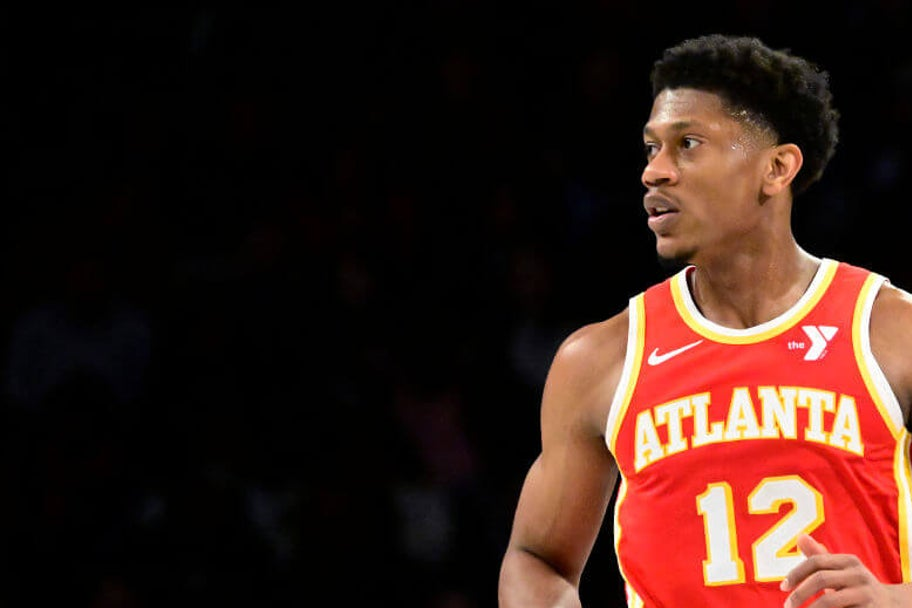The Cavaliers entered the trade deadline with three clear goals: upgrade the wing position, get under the tax and add stability to the roster. I was skeptical whether they could accomplish all of it in one move, but the acquisition of De’Andre Hunter nailed all three targets — and they did it without surrendering their most valuable trade pieces.
No team with legitimate championship aspirations helped themselves more at this deadline than the Cavs.
In the process, they may have finally solved their need at the wing position with Hunter, who has the kind of length the Cavs covet and enough shooting to help on the perimeter. At 6-foot-8 and with a wingspan over 7 feet, Hunter can play either forward position but seems ideal to start at the 3, providing much-needed length to an undersized backcourt.
As much as Kenny Atkinson likes to switch everything on pick-and-rolls, the Cavs could sometimes get exposed in undesirable mismatches against some of the elite teams — such as Max Strus wrestling Kristaps Porzingis the other night in the loss to Boston. Hunter fixes that. He becomes a viable defender on the longer wing players teams like Boston, Houston and Oklahoma City can deploy.
Who were the biggest winners of an unprecedented NBA trade deadline?
Hunter became available and a bit expendable in Atlanta after Jalen Johnson’s emergence and Zach Risacher’s drafting last summer with the first pick. Hunter moved into a full-time bench role this year and is having his best season as a 3-point shooter at 39 percent. He is a career 38-percent shooter on corner 3s, a shot that will be open all day in this lineup with the way the Cavs’ guards can drive and kick.
Equally important to his on-court fit is the way he fits on the cap sheet now and in the future. Hunter is making $21.7 million this year and is under contract for two more years at reasonable prices.
The Cavs are getting a baller in De’Andre Hunter 🔥 pic.twitter.com/McXh45LgTx
— SN Ohio (@SN_Ohio) February 6, 2025
By moving off Caris LeVert and Georges Niang, the Cavs shed the necessary money to get under the tax line. They will not be a taxpayer this season and instead will receive a payout after the season from the taxpaying teams. The exact figure isn’t yet known, but last year non-taxpaying teams received about $12 million from the league.
More importantly, the Cavs won’t become a tax team until next season, meaning they won’t hit “repeat offender” status and more punitive tax penalties until the 2028-29 season. That gives the Cavs a healthy 3- to 4-year window to win a championship before they have to start making difficult roster and financial decisions.
Free, daily sports updates direct to your inbox.
Free, daily sports updates direct to your inbox.
Until then, the Cavs are almost assuredly vaulting to second-apron status on the salary cap starting next season. They’ll have 10 players — Hunter, Donovan Mitchell, Darius Garland, Evan Mobley, Max Strus, Jarrett Allen, Isaac Okoro, Dean Wade, Jaylon Tyson and Craig Porter Jr. — under contracts totaling more than $209 million, which is over the projected apron. Being a second-apron team means the Cavs won’t be able to combine salaries of multiple players in trades, they can’t send cash out in trades and they can’t sign-and-trade their own players to acquire others.
There are other restrictions as well that involve freezing draft picks if teams stay in that stratosphere long enough. The early lesson to learn about being in the aprons is to not have any glaring roster weaknesses because they are nearly impossible to repair — look at the struggles the Phoenix Suns are having as a team that rushed into the second apron before they were ready to compete.
By moving off LeVert’s expiring contract and securing Hunter for two more years, the Cavs added more long-term roster stability. They still want to re-sign Ty Jerome this summer, but it will be difficult and complicated under cap rules. Jerome can likely earn more by leaving as a free agent. Sam Merrill is also an unrestricted free agent after the season. The Cavs won’t be able to keep everyone.
Cleveland has two open roster spots now and could be active in the buyout market. While either Hunter or Dean Wade could be a backup big (basically, whichever one doesn’t start), the Cavs could still use more size off the bench as insurance in the playoffs. The Cavs dumped enough money to fit two veterans on buyouts.
The Cavs have struggled to fill the small forward position with anyone not named LeBron James for 20 years. They ignored the position during the four years James was in Miami and they have patched it together in the years since he left for Los Angeles. Okoro didn’t shoot and score enough to hold the position full time and Strus is undersized for the spot. Wade has been intriguing there this year but hasn’t been able to stay healthy for long stretches.
Hunter is the perfect fit with the ideal size. The Cavs were already legitimate title contenders in the East. Now there is a clear delineation between Boston and Cleveland and everyone else in the conference.
(Photo: Steven Ryan / Getty Images)





